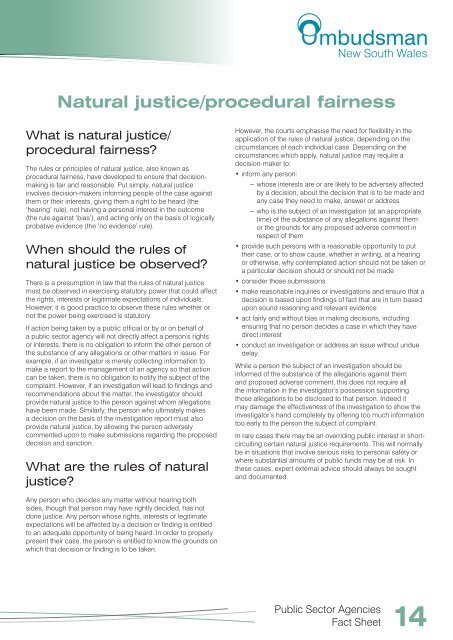Natural justice/procedural fairness - NSW Ombudsman
Natural justice/procedural fairness - NSW Ombudsman
Natural justice/procedural fairness - NSW Ombudsman
You also want an ePaper? Increase the reach of your titles
YUMPU automatically turns print PDFs into web optimized ePapers that Google loves.
<strong>Natural</strong> <strong>justice</strong>/<strong>procedural</strong> <strong>fairness</strong><br />
What is natural <strong>justice</strong>/<br />
<strong>procedural</strong> <strong>fairness</strong>?<br />
The rules or principles of natural <strong>justice</strong>, also known as<br />
<strong>procedural</strong> <strong>fairness</strong>, have developed to ensure that decisionmaking<br />
is fair and reasonable. Put simply, natural <strong>justice</strong><br />
involves decision-makers informing people of the case against<br />
them or their interests, giving them a right to be heard (the<br />
‘hearing’ rule), not having a personal interest in the outcome<br />
(the rule against ‘bias’), and acting only on the basis of logically<br />
probative evidence (the ‘no evidence’ rule).<br />
When should the rules of<br />
natural <strong>justice</strong> be observed?<br />
There is a presumption in law that the rules of natural <strong>justice</strong><br />
must be observed in exercising statutory power that could affect<br />
the rights, interests or legitimate expectations of individuals.<br />
However, it is good practice to observe these rules whether or<br />
not the power being exercised is statutory.<br />
If action being taken by a public offi cial or by or on behalf of<br />
a public sector agency will not directly affect a person’s rights<br />
or interests, there is no obligation to inform the other person of<br />
the substance of any allegations or other matters in issue. For<br />
example, if an investigator is merely collecting information to<br />
make a report to the management of an agency so that action<br />
can be taken, there is no obligation to notify the subject of the<br />
complaint. However, if an investigation will lead to fi ndings and<br />
recommendations about the matter, the investigator should<br />
provide natural <strong>justice</strong> to the person against whom allegations<br />
have been made. Similarly, the person who ultimately makes<br />
a decision on the basis of the investigation report must also<br />
provide natural <strong>justice</strong>, by allowing the person adversely<br />
commented upon to make submissions regarding the proposed<br />
decision and sanction.<br />
What are the rules of natural<br />
<strong>justice</strong>?<br />
However, the courts emphasise the need for fl exibility in the<br />
application of the rules of natural <strong>justice</strong>, depending on the<br />
circumstances of each individual case. Depending on the<br />
circumstances which apply, natural <strong>justice</strong> may require a<br />
decision-maker to:<br />
• inform any person:<br />
– whose interests are or are likely to be adversely affected<br />
by a decision, about the decision that is to be made and<br />
any case they need to make, answer or address<br />
– who is the subject of an investigation (at an appropriate<br />
time) of the substance of any allegations against them<br />
or the grounds for any proposed adverse comment in<br />
respect of them<br />
• provide such persons with a reasonable opportunity to put<br />
their case, or to show cause, whether in writing, at a hearing<br />
or otherwise, why contemplated action should not be taken or<br />
a particular decision should or should not be made<br />
• consider those submissions<br />
• make reasonable inquiries or investigations and ensure that a<br />
decision is based upon fi ndings of fact that are in turn based<br />
upon sound reasoning and relevant evidence<br />
• act fairly and without bias in making decisions, including<br />
ensuring that no person decides a case in which they have<br />
direct interest<br />
• conduct an investigation or address an issue without undue<br />
delay.<br />
While a person the subject of an investigation should be<br />
informed of the substance of the allegations against them<br />
and proposed adverse comment, this does not require all<br />
the information in the investigator’s possession supporting<br />
those allegations to be disclosed to that person. Indeed it<br />
may damage the effectiveness of the investigation to show the<br />
investigator’s hand completely by offering too much information<br />
too early to the person the subject of complaint.<br />
In rare cases there may be an overriding public interest in shortcircuiting<br />
certain natural <strong>justice</strong> requirements. This will normally<br />
be in situations that involve serious risks to personal safety or<br />
where substantial amounts of public funds may be at risk. In<br />
these cases, expert external advice should always be sought<br />
and documented.<br />
Any person who decides any matter without hearing both<br />
sides, though that person may have rightly decided, has not<br />
done <strong>justice</strong>. Any person whose rights, interests or legitimate<br />
expectations will be affected by a decision or fi nding is entitled<br />
to an adequate opportunity of being heard. In order to properly<br />
present their case, the person is entitled to know the grounds on<br />
which that decision or fi nding is to be taken.<br />
Public Sector Agencies<br />
Fact Sheet<br />
14
<strong>Natural</strong> <strong>justice</strong>/<strong>procedural</strong> <strong>fairness</strong><br />
Benefits for persons whose<br />
rights or interests may be<br />
affected<br />
<strong>Natural</strong> <strong>justice</strong> allows persons whose rights or interests may be<br />
affected by decisions the opportunity:<br />
• to put forward arguments in their favour<br />
• to show cause why proposed action should not be taken<br />
• to deny allegations<br />
• to call evidence to rebut allegations or claims<br />
• to explain allegations or present an innocent explanation, and/<br />
or<br />
• to provide mitigating circumstances.<br />
Benefits for investigators and<br />
decision-makers<br />
While natural <strong>justice</strong> is, at law, a safeguard applying to the<br />
individual whose rights or interests are being affected, an<br />
investigator or decision-maker should not regard such<br />
obligations as a burden or impediment to an investigation or<br />
decision-making process. <strong>Natural</strong> <strong>justice</strong> can be an integral<br />
element of a professional decision-making or investigative<br />
process – one that benefi ts the investigator or decision-maker<br />
as well as the person whose rights or interests may be affected.<br />
For an investigator or decision-maker, natural <strong>justice</strong> serves a<br />
number of related functions:<br />
• it is an important means of checking facts and of identifying<br />
major issues<br />
• the comments made by the subject of the complaint or<br />
the interested party will expose any weaknesses in an<br />
investigation, decision-making process or information<br />
on which a decision is to be based, which avoids later<br />
embarrassment, and<br />
• it also provides advance warning of the basis on which the<br />
investigation report or administrative decision is likely to be<br />
attacked.<br />
Further information<br />
For further information, see also:<br />
• Good Conduct and Administrative Practice – Guidelines for<br />
state and local government, <strong>NSW</strong> <strong>Ombudsman</strong>, August 2003<br />
• The Complaint Handlers Tool Kit (2nd edition), <strong>NSW</strong><br />
<strong>Ombudsman</strong>, June 2004<br />
Investigating complaints – A manual for investigators<br />
(2nd edition), <strong>NSW</strong> <strong>Ombudsman</strong>, June 2004<br />
Contact us for more information<br />
Our business hours are: Monday to Friday, 9am–5pm (Inquiries section closes at 4pm)<br />
If you wish to visit us, we prefer you make an appointment. Please call us fi rst to ensure your complaint is within our jurisdiction and our staff are available to see you.<br />
Level 24, 580 George Street<br />
Sydney <strong>NSW</strong> 2000<br />
Email nswombo@ombo.nsw.gov.au<br />
Web www.ombo.nsw.gov.au<br />
General inquiries 02 9286 1000<br />
Facsimile 02 9283 2911<br />
Toll free (outside Sydney metro) 1800 451 524<br />
Tel. typewriter (TTY) 02 9264 8050<br />
Telephone Interpreter Service (TIS): 131 450<br />
We can arrange an interpreter through<br />
TIS or you can contact TIS yourself before<br />
speaking to us.<br />
© Crown Copyright, <strong>NSW</strong> <strong>Ombudsman</strong>, November 2010, Reprinted March 2012 ISBN: 978-1-921132-79-7 03/2012<br />
This work is copyright, however material from this publication may be copied and published by State or Federal Government Agencies without permission of the <strong>Ombudsman</strong> on the condition that<br />
the meaning of the material is not altered and the <strong>NSW</strong> <strong>Ombudsman</strong> is acknowledged as the source of the material. Any other persons or bodies wishing to use material must seek permission.<br />
This fact sheet is one of a series produced by the <strong>NSW</strong> <strong>Ombudsman</strong>. Feedback is welcome.

















